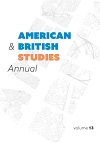
| ARTICLES |
PAGE |
ABSTRACTS |
|
Jakub Ženíšek |
9 | |
|
Petr Kopecký |
23 | ► |
|
Zdenko Zeman, Marija Geiger Zeman |
37 | ► |
|
Bożena Kucała |
51 | |
|
Barbora Vinczeová |
67 | |
|
Christopher E. Koy |
82 | |
|
Tomáš Jajtner |
98 | |
|
Stanislav Kolář Ordinary Stories in Extraordinary Times: Marcie Hershman’s Tales of the Master Race |
108 | |
|
Dida Syarifa Nursyamsi Hilman, Dadung Ibnu Muktion A Transgressive Figure or a Puppet of the Patriarchy? The Action Heroine in Atomic Blonde |
119 | ► |
| STUDENT CONTRIBUTION | ||
|
Maria Klečková “Neither Innocent, nor Guilty”: the Scapegoat in the Ironic Short Stories of William Somerset Maugham |
137 | ► |
|
BOOK REVIEW |
||
|
Jiří Flajšar |
153 |
|
ABSTRACTS, KEYWORDS AND CONTACT DETAILS
Author
Jakub Ženíšek
Title of the Article
Melvillian Meditations in Charles Johnson’s “Executive Decision”
Abstract
Regardless of its philosophical para-text, an overt reading of Charles Johnson’s short story “Executive Decision” suggests very obvious ideological connotations. The story displays the racial pride and black agency along with the ideologically loaded either-or antithesis of a competition between a white woman and a black man within a protracted job interview. At one point, the story even lapses into a sociological exposé. However, Johnson’s intertextual pairing of the story with Melville’s “Bartleby the Scrivener” significantly enhances its allusive potential, thereby redeeming the formulaic template of racial melodrama which Johnson frequently criticizes. By casting the African American character as a stand-in for Bartleby, the story opens up its narrow concern (affirmative action) to the larger theme of redistributive justice and the dangers of self-entitlement. In an eclectic reading, the story can even signify on the scarcity of positive male African American role models in the public eye, a theme which Johnson is very much preoccupied with.
Keywords
tendentious art, autonomous art, formulaic writing, philosophical fiction, intertextuality, allusion, Charles Johnson, Herman Melville, Bartleby the Scrivener
Author
Petr Kopecký
Title of the Article
Science and/in Literature: A Californian Perspective
Abstract
This essay explores the intersection of science and literary expression in Californian literature. It aims to analyze a current in said literature characterized by the convergence of literature and science. In so doing, the essay probes four thematic layers that play a prominent role in Californian environmental literature: 1) ecology and Darwinian science, 2) the holistic approach to science, 3) the geological imagination, 4) and imagined worlds in ecological science fiction. Investigating literary works spanning from the late 19th century to the early 21st century, the essay addresses authors such as John Muir, Mary Austin, Robinson Jeffers and John Steinbeck, each of whom incorporated science into their imaginative writing. In addition to these quintessential Californian authors, the essay also probes texts by writers who experienced the dramatic degradation of the California environment in the 1960s and was further aggravated by climate change at the turn of the century. These writers include Gary Snyder, Ernest Callenbach, Ursula Le Guin and Kim Stanley Robinson. The essay identifies a distinctive and coherent thread that runs through the texts under scrutiny, one characterized by a critical and skeptical attitude to fragmented science and its ambition to control rather than apprehend the natural world. In contrast, the writers draw from the inclusive and holistic approach applied by Charles Darwin.
Keywords
American literature, California, environment, ecocriticism, science, John Muir, Mary Austin, Robinson Jeffers, John Steinbeck, Gary Snyder, Ernest Callenbach, Ursula K. Le Guin, Kim Stanley Robinson
Author
Zdenko Zeman & Marija Geiger Zeman
Title of the Article
Searching for a Younger Self: Time, Music and Ageing Masculinities in the Novel A Visit from the Goon Squad by Jennifer Egan
Abstract
The idea that literature matters for an understanding of socio-cultural processes and phenomena is confirmed in Jennifer Egan’s inspiring novel A Visit from the Goon Squad. Four decades since the appearance of punk rock music and culture it has become necessary to incorporate issues concerning ageing in the analysis of musical subcultures (Bennet, 2018, Jennings, 2015). The contrasts of past and present, youth and ageing, older and young generations suggest that time is the most important category as an almost invisible, silent, relentless and
invincible driving force. This emphasized temporal perspective shows the inevitability and incessancy of changes not only in human lives but also in the ageist world of the music industry.
Keywords
time, punk rock, ageing, subculture, music industry, masculinity, identity, Jennifer Egan
Author
Bożena Kucała
Title of the Article
The Past as a Multi-perspective Structure in Matthew Kneale’s English Passengers
Abstract
Matthew Kneale’s neo-Victorian novel English Passengers (2000) is underlain by contemporary, revisionist views of Victorian ideologies. In particular, by placing its action on board a ship headed towards Tasmania as well as in Tasmania itself, the novel examines colonial attitudes and relations between cultures. Accordingly, it has been analysed as a novel about national identity and imperial politics (Boccardi 2009). This article takes the novel’s form as the starting point for analysis. Told in twenty voices, with events developing on two temporal planes which continually intersect and eventually converge, English Passengers foregrounds the co-existence of multiple perspectives and the simultaneity of events in its representation of the past, and by doing so it disrupts the convention of narrative. The article argues that, rather than relying on linearity and causality, Kneale’s novel constructs an image of the past as a structure with many dimensions, in which temporal change depends on a variety of overlapping, conflicting or convergent points of view and attitudes. Ultimately, the discussion attempts to demonstrate that through its structure English Passengers, without being overtly metafictional or metahistorical, addresses the problem of representing the past.
Keywords
historical fiction, postcolonial fiction, neo-Victorian fiction, multiperspectivity, Matthew Kneale
Author
Barbora Vinczeová
Title of the Article
Death Has a Name: The Personification of Death in British Fantastic Fiction
Abstract
The paper addresses the issue of the personification of death in British fantastic fiction based on an analysis of two novels, Pratchett’s Mort and Lee’s Death’s Master. Common features are located and discussed, drawing parallels between the two representations of death. These parallels are found on several levels, specifically the appearance and personality of death, purpose and origin, the realm of death, sexuality and gender, tiredness and the substitution of death.
Keywords
death, personification, fantasy, fiction, Lee, Pratchett, British, Mort, Death’s Master
Author
Christopher E. Koy
Title of the Article
More Than Mere Metamorphoses: Animals in Charles W. Chesnutt’s Conjure Stories
Abstract
This contribution will apply the theory of Animal Studies, an inter-disciplinary field which encompasses, among many other areas, literary studies. In the African American conjure fiction written by Charles Chesnutt, the animal behavior, human-nonhuman animal interactions, anthropomorphic representations of animals and the expanding ethical considerations (beyond human dimensions) will be examined. Applying Animal Studies to literary texts means in effect synthesizing writing on animals and charting their connections to human consciousness and human action toward the nonhuman world. Charles Chesnutt’s fourteen conjure tales were written largely in dialect in the 1880s and 1890s and are set in a Southern plantation community. They include enslaved humans who undergo metamorphoses into various animals, some animals under the supernatural control of conjurers and finally the various animals to be consumed under ethically questionable circumstances within the slave community. The attempts at resolution to conflicts is said to reverberate in black culture well after slavery had ended, according to the black narrator.
Keywords
African American literature, Charles Chesnutt, The Conjure Woman, Animal Studies, Voodoo, metamorphoses,
slavery, animal meat, animal cruelty
Author
Tomáš Jajtner
Title of the Article
Unto This Last: John Ruskin and the Beginnings of English Ecocriticism
Abstract
The following paper deals with the beginnings of ecocritical thought in John Ruskin’s essay Unto This Last (1862). The article presents the context of its economic thought and relates it to the beginnings of “ecology” in the work of German biologist Ernst Haeckel (1834-1919). The key aspect of Ruskin’s approach is a close link between a humane economy and a sense of responsibility for the environment. In his sweeping analysis of laissez-faire capitalism, he contrasts creation with production, focuses on the reductive terminology of political economy and
its potentially devastating consequences if it becomes the leading ideology of the state. The final part of the paper assesses the importance of this essay for the development of ecocritical thought as well as its relevance today.
Keywords
John Ruskin, Victorian essays, ecocriticism, economics, ecological thought
Author
Stanislav Kolář
Title of the Article
Ordinary Stories in Extraordinary Times: Marcie Hershman’s Tales of the Master Race
Abstract
This paper examines the categories of perpetrators, bystanders and victims as represented among the characters of Marcie Hershman’s short story cycle Tales of the Master Race. The main focus is on the characters of perpetrators, as it is predominantly from their perspectives that Hershman depicts life in a small German town during the Third Reich. The paper aims to explore the social-psychological reasons for the perpetration of evil, be it conformity to authorities or ideological anti-Semitism. It also points to a certain fluidity in the examined categories of the characters, demonstrating the thin borders among them.
Keywords
Marcie Hershman, short story, perpetrators, bystanders, victims, Third Reich, conformity, anti-Semitism, the Holocaust
Author
Dida S. N. Hilman & Dadung I. Muktion
Title of the Article
A Transgressive Figure or a Puppet of the Patriarchy? The Action Heroine in Atomic Blonde
Abstract
Although women’s empowerment has progressed, various media products still represent women in a negative light. They are commonly stereotyped and shown as sexual objects in these media products. Nonetheless, major breakthroughs have been made in the action film genre. Female action heroes have begun to be represented as transgressive women who oppose the patriarchal notion that masculine qualities are exclusively for men. The film Atomic Blonde features a lead action heroine and presents her as a strong woman who embodies characteristics of both masculinity and femininity. This study aims to discover how this heroine is represented in this action film. A qualitative approach with narrative and non-narrative analysis was applied to conduct this study. In doing so, the writers used Judith Halberstam’s theory of female masculinity that scrutinizes performances of masculinity by female subjects. The theory of gender, sexuality, and toughness by Jeffrey Brown was also employed to examine the aforementioned aspects of action heroines. One research finding is that despite being characterized as a powerful and tough woman, this action heroine is still subjected to hypersexualization and subordination. It demonstrates that regardless of how much power an action heroine possesses, she is still bounded by the patriarchy.
Keywords
action heroine, female masculinity, femininity, hypersexualization, masculinity
Author
Maria Klečková
Title of the Article
“Neither Innocent, nor Guilty”: the Scapegoat in the Ironic Short Stories of William Somerset Maugham
Abstract
This article aims to examine several short stories of W. Somerset Maugham in terms of ironic victimization. Northrop Frye’s claim that a pharmakos or a scapegoat is a typical ironic victim inspired my idea of dissecting a number of characters in Maugham’s stories as pharmakoi. In the analysis two types of pharmakoi characters were discovered: primary and secondary ones, with each implying a different targeting of irony. Primary pharmakoi are disguised as scapegoat characters, but it is through the contact with them that the real victim of irony is revealed. The stories these characters are featured in are usually more complex, and the irony is built either on a stereotype or an archetype. The stereotype proposes the thematical background on which the irony is built, while the archetype – here a structural model – is based on the readers’ subconscious expectations. In secondary scapegoat
stories, irony is targeted at one of the characters or the community they stereotypically represent. Several short stories are analysed in the article: “The Mother,” “The Fall of Edward Barnard,” “The Alien Corn” and “Rain.”
Keywords
W. S. Maugham, irony, scapegoat, pharmakos, victimization

